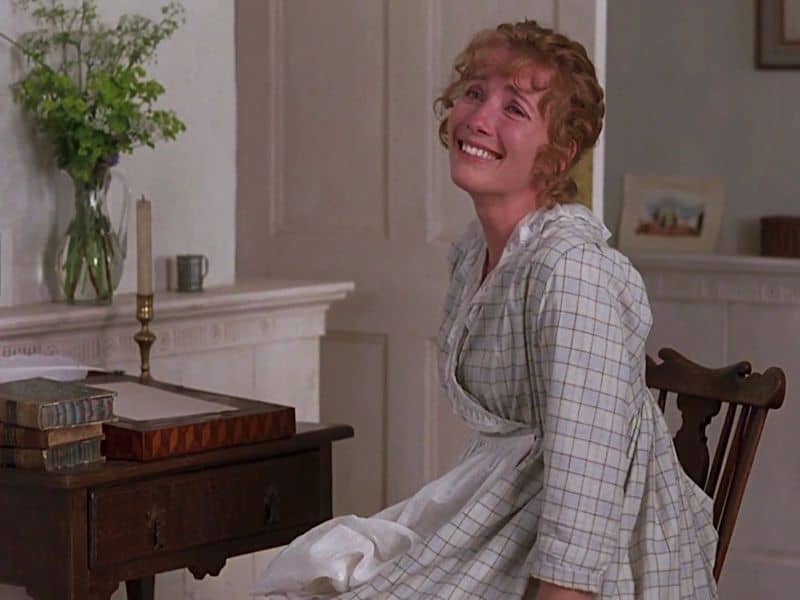
Sense and Sensibility is about two young girls in England in the early 1800s, desperately traversing the line between love and monetary stability after their father’s death leaves them nearly penniless. It tells the story of a mother fearing for the future of her girls, of men grappling with the unfamiliarity of their own feelings. But, perhaps more than anything, Sense and Sensibility is about Jane Austen, who wrote the novel in secret two-hundred years before its first theatrical film adaptation made its debut.
Originally titled Elinor and Marianne, Sense and Sensibility was Austen’s first novel. She was only a teenager when she began writing it, in 1790, but it wasn’t published for another sixteen years. Being a female author in Austen’s time was practically unheard of. Upper-middle-class women like Austen were required to marry into money, as they could not make money of their own. The task, then, of finding a good husband is one that bears high stakes in all of Austen’s novels.
Ang Lee’s 1995 film of Sense and Sensibility follows the Dashwood sisters, Elinor (Emma Thompson, who also wrote the Oscar-winning adapted screenplay) and Marianne (Kate Winslet), on their respective quests for a husband. Both journeys come with much trial and tribulation and a lot of heartbreak. Elinor falls for the rich, charming, and handsome Edward (Hugh Grant), only to discover that he has been engaged for five years to Lucy Steel (Imogen Stubbs).
At the same time, Marianne has a short-lived but passionate affair with John Willoughby (Greg Wise), only for him to abandon her in pursuit of a more prosperous engagement. Indeed, it wasn’t only men that married for financial stability. But as soon as they married money, it became their own.
The film builds up heartbreak after heartbreak until it meets its final moment of catharsis. Elinor has resigned herself to the reality that she will never be with her beloved again, until he shows up, riding through the countryside on horseback like a valiant hero, to her doorstep. Edward tells Elinor that he is in love with her, and always will be.
And then, Elinor breaks down and cries, cracking the tension that the sadness, frustration, and anxiety of the lost opportunity for love have brought. At that moment, Elinor has not only realized the relief of not having to worry about supporting herself and her family monetarily but the relief of love. Indeed, it is overwhelming. And, with that, Sense and Sensibility comes to an end.
So, where does Austen fit into all of this? Well, as a writer in a time when women weren’t really allowed to write, she wasn’t given many options. Like the Dashwood sisters, she was expected to marry well, but, given the fact that she never did, it can only be assumed that writing was more important to her.
When she wrote the ending of Sense and Sensibility, she did not yet know the catharsis that Elinor was experiencing. And she likely wouldn’t, not until she was finally recognized as an author, many years later. Nonetheless, both heroines manage to kill two birds with one stone. They support themselves in a world where options are limited for women, and they live out their respective passions.
Sense and Sensibility’s male characters are not subversive in the novel or the film – quite the opposite. They are dark, brooding, charming, mysterious. The main love interest is very appropriately played by a young Hugh Grant, which tells you just about everything you need to know.
No; what is subversive is the women. In a society where men would rather avoid the presence of a woman they are interested in altogether than confront them with simple truths, love is subversive. In a society where marrying someone in a different class meets a punishment worse than death, love is rebellious. Love, at the very most, is met with laughter and teasing from the gossips of the film. Marianne is berated for crying and losing sleep over Willoughby as it is unladylike.
And, yet, this almost prohibited subject is particularly why Elinor breaks down at the end of Sense and Sensibility. Like Austen, she dared to do something taboo, and finally give in to her vibrant emotions.
Of course, we’d all like to end up with a young Hugh Grant, but there’s a reason Elinor reacts in the surprising way she does. For her, her marriage is a matter of life and death. The cathartic, grandiose ending almost feels comically warm, if it weren’t jarring in its truthful nature. Without daring acts such as these from women, the history of literature and cinema would undoubtedly be very, very different.
Related Topics: Ang Lee

